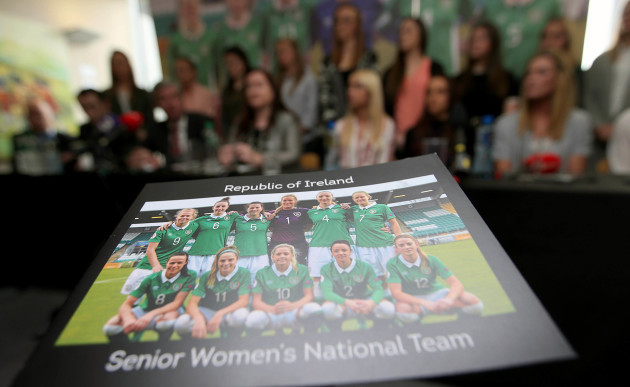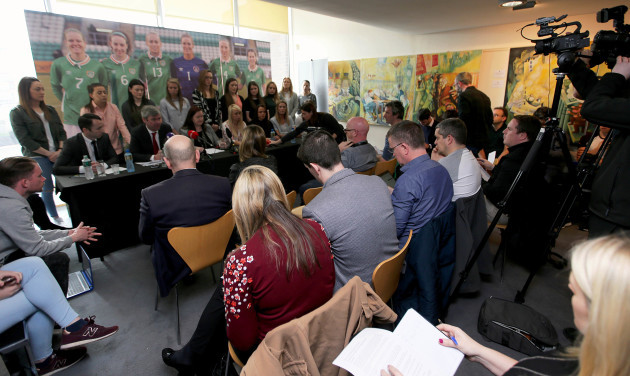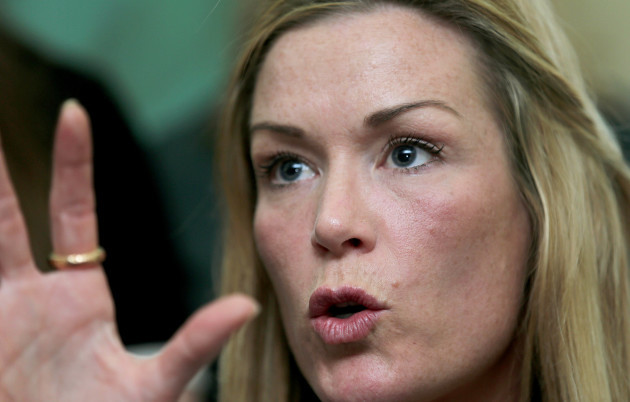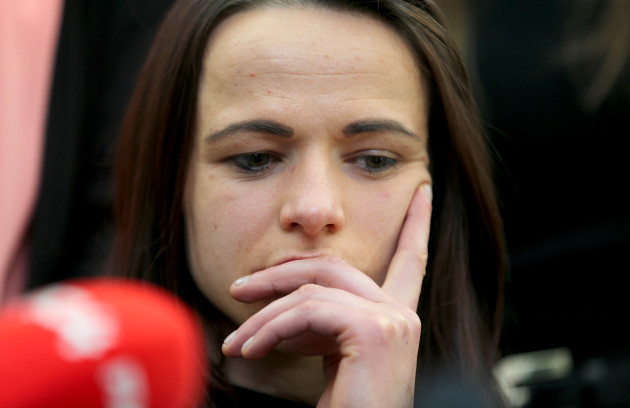YESTERDAY MORNING, A group of 14 Irish international soccer players with 550 caps and one Fifa Puskas nomination between them, held a press conference along with the PFAI and Siptu in Liberty Hall to explain why they were contemplating strike action following negotiations with their governing body.
The unprecedented retirement announcement of Colm ‘The Gooch’ Cooper an hour prior to kick-off threatened to steal the show – and the headlines – in advance; but no, the top brass of sports journalism were all there in the room to hear what the players had to say, and bear witness to what will be remembered as one of the most remarkable press conferences in Irish sporting history.
But it wasn’t Shane Long, Robbie Brady and Jeff Hendrick sitting at the top table and drawing the football media out in force with their revelations – it was Emma Byrne, Stephanie Roche, Áine O’Gorman and their fellow members of the Irish international women’s squad.
During the hour-long press conference, the players and their representatives gave detail of their efforts to engage with the FAI over the past two years to secure basic supports for when they tog out to represent Ireland on an international stage, and why their negotiations had ultimately come up short. The squad felt that they had been left with no other option but to air an embarrassing litany of ill-treatment from their publicly funded governing body, and threaten refusal to play next Monday’s international friendly against Slovakia in order for them to be taken seriously.
Those in attendance listened in disbelief; their tweets and soundbites devoured by followers – an instant and widespread showing of sporting solidarity permeating social media before the event had even reached its conclusion. A group of international athletes so visibly uncomfortable at discussing how they have been mistreated couldn’t but leave the general public outraged, and embarrassed.
The list of issues that the players and the FAI have been unable to resolve during two years of negotiations are astounding in their pettiness – it would be hard to argue that the squad are ‘gold-digging’ when the primary issues include the access to a nutritionist, gym membership, and strength and conditioning programmes that come as standard with many amateur club teams around the country.
Much has been made since of the scenario described by the players in which they receive team tracksuits in the airport when travelling abroad, and hence must change in the toilets, and return them afterwards – a process which they described as “humiliating”. Likewise, a simple request for guaranteed wifi in their accommodation when on tour has grabbed headlines – this isn’t so that the players can update their Instagram or watch Netflix in their hotel rooms; but instead a sobering reminder that many of them must keep their work lives afloat online in between training and playing matches.
Similarly, some squad members take unpaid leave for the purpose of playing international football. It is unimaginable to think that the likes of James McClean or Jonathan Walters would be asked to go out of pocket to represent their country, but it’s fine for the women, apparently.
The FAI have outright refused to engage with the PFAI, who are representing the group of players – save for sending them correspondence bordering on a threat that going public with grievances could ultimately endanger the players’ careers. Well, to quote that very letter, the FAI needn’t have worried about any damage to the players’ reputations – for “those many young people” who look up to them as “role models”, there is no stronger image for them to see than that of a group of international sportswomen, united and proudly wearing the green of the country they represent, standing outside the historic Liberty Hall having just bravely blazed a trail for themselves, their fellow female athletes, and the future generations that will follow.
As captain Emma Byrne said, “We’re here because we want to be able to field the best national team possible and be able to compete at the highest level possible.” These players are fuelled entirely by their passion for their sport and their desire to compete internationally for Ireland, and it shows.
The lead sports story on RTÉ’s Six One News; top billing on both Second Captains and Off The Ball; trending on Twitter for the entire day; countless articles from national newspapers and leading online publishers. With the level of coverage received, the story was unmissable. So it’s no wonder that the football purists felt it necessary to chime in, pointing out that there the men’s national team is more popular, that not every team that wants funding can get it, and that these players should make good with what they’re given.
Well here’s the thing, Keyboard Warriors. When a national governing body is in receipt of public money, some of which is conditional on increasing women’s participation in the sport, then the public are entitled to know how that money is distributed, and have the impact of that money accounted for.
“As usual women’s sports are looking to be subsidised out of the men’s earnings. Girl power and all that…”
The Irish women’s squad are certainly not asking for 50% of the public money that the FAI receive, or indeed any support from the men’s team whatsoever. They’re asking for something much more straightforward than that – to be treated with the respect, dignity and equality owed to a team of athletes who represent Ireland internationally.
“Would love a cash investment for our Thursday night five-a-side too but nobody watches us either…”
We’re truly sorry your local five-a-side squad doesn’t receive a grant from Sport Ireland. We really are. But if a governing body which received €2.7m of taxpayers’ money in 2015 alone still can’t meet the basic requirements of one of their senior national teams, then there is clearly a problem.
“There is no interest in the women’s game.”
The reaction yesterday has more than proved otherwise. Also you just commented on an article about the women’s game… that’s interest. Oh, and more than 750m television viewers watched the Fifa Women’s World Cup in 2015, FYI.
The situation that the national senior women’s football team find themselves in is the result of a culture in the FAI, in the realm of football, and in the wider context of sport. The high-handedness of the FAI’s statement in response to yesterday’s press conference was in a tone seemingly reserved just for the women’s team.
Earlier today on Morning Ireland, Noel King – an employee of the FAI and a former manager of the women’s national team – repeatedly referred to the squad as “girls”. Language is hugely important in a situation like this one – and that use of that one single word in itself speaks volumes. It is also evocative of a wider sporting culture which views female athletes as lesser than their male counterparts – easily gauged by the myriad of Gaelic footballers, rugby players, camogie players, cricket players, hockey players and Olympians who rowed in behind the squad yesterday with messages of support and solidarity.
In their club lives, some members of the Irish squad play alongside the absolute cream of international footballing talent – in addition to the many Lionesses they call team-mates, an influx of World Cup-winning USA soccer superstars into The FA Women’s Super League means that this season Katie McCabe is playing alongside Heather O’Reilly at Arsenal; likewise Niamh Fahey with Crystal Dunn at Chelsea; with Megan Campbell teaming up with reigning Fifa World Player of the Year Carli Lloyd at Manchester City.
The US women’s national team are no strangers to standing up for their rights and gaining recognition for it. What began in 1994 with pioneers like Julie Foudy and Mia Hamm extends to the current generation, with leading members of the squad continually taking their governing body US Soccer to task over improving payment and conditions.
Similarly, we have Denise O’Sullivan flying the flag state-side with NWSL club Houston Dash, and Megan Connolly on scholarship with Florida State University for her on-pitch talents, feeling the full benefit of Title XI legislation – a US federal law that ensures equality and parity for college athletes.
These players have all witnessed first-hand, often on a daily basis, that higher standards certainly do exist for female soccer players internationally, and drastic change is required here at home in order to keep up with the pace. Only last week, they witnessed the USA women’s ice hockey squad – with a mantra of “be bold for change” – in an almost identical situation to themselves, coming out the other side of it with a historic deal secured, bolstered by a huge outpouring of athlete, media and public support that their governing body simply could not ignore.
The Irish women’s national team have now bravely stepped up to fight for their own basic rights, showing immense courage in taking action. As things currently stand, this group of women, fuelled entirely by passion for their sport, are on the verge of foregoing the opportunity to represent their country next Monday.
The players have publicly expressed thanks for the outpouring of support that they have received in the past 24 hours, but that support needs to extend beyond the immediate aftermath of sending message of solidarity on Twitter, or linking to a news story on Facebook.
The best way to fundamentally support these women is to actually physically support them – look up fixtures, go to an event, and bring a family member or friend along. Channel your reactive rage to this story into showing the FAI that we want the best for the squad in the long-term, as they build towards the goal of securing qualification for a major tournament.
Finally, to the players – never doubt that a small group of thoughtful, committed citizens can change the world.
Indeed, it’s the only thing that ever has.
– Elaine Buckley and Emily Glen produce the FAIR GAME Podcast, winner of Best Podcast Series at the 2016 Web Awards.
The42 is on Instagram! Tap the button below on your phone to follow us!





